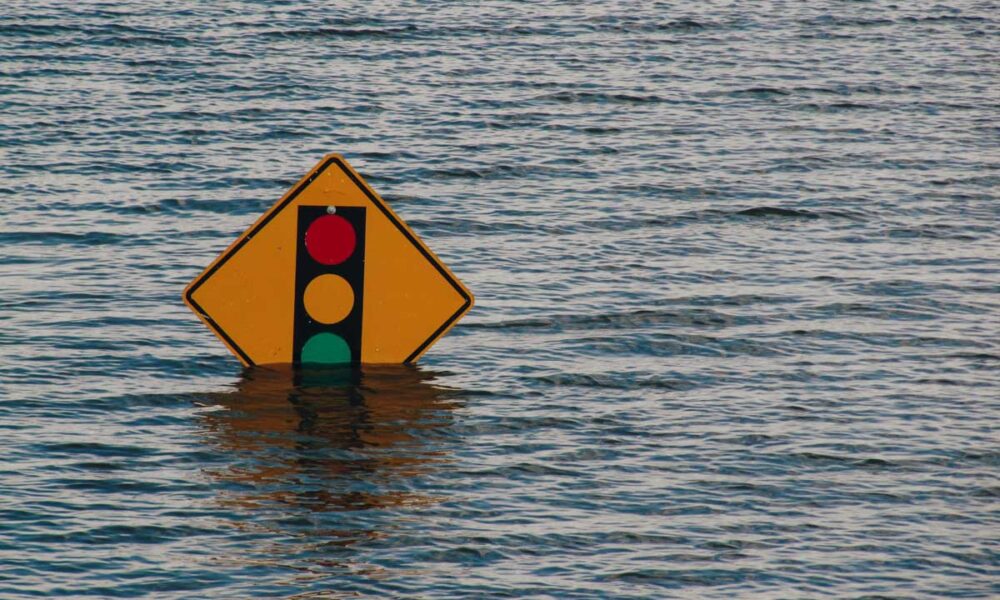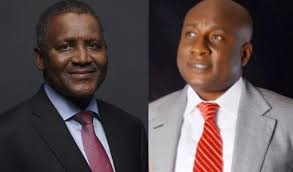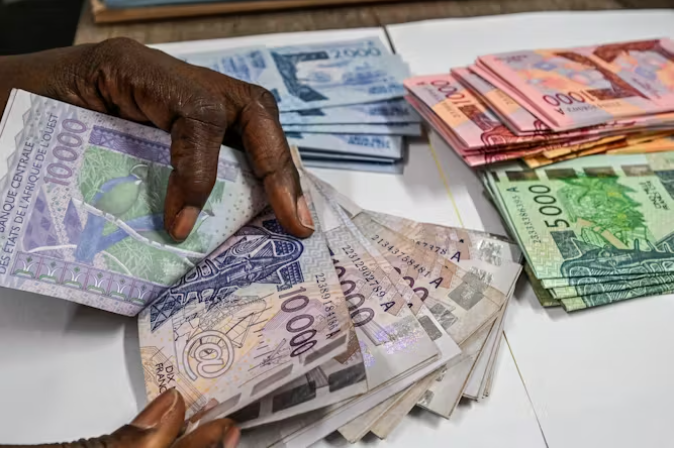BUSINESS & ECONOMY
Legitimacy of Values during Climate Change
Published
2 years agoon
By
Editor
Post-industrial and neo-technological societies have rigorously separated the stories of cultural values and those of the earth’s nature and climate. Human civilizations have been fully dependent on the wilderness of nature and the particularities of climate for their survival and success for millennia. It is understandable that this decoupling in the 20’th century was inevitably perceived as a desirable outcome. For some years now these two stories are coming together once again meshed by the increased unpredictability and volatility of extreme climate events and their recorded and proven impacts on society at large. They are coming together at a time of repeated signs of perceived and real social and economic fragility, which if not absorbed and equitably remediated may trigger systemic changes. Many complex constructs are used to define systemic change. Among them are some traditional ones of economic shock and of increased volatilities in financial markets. More tangible and physical constructs appeal to unique economic issue such as of the widening gap in insurance coverage. Most recently some modern constructs of climate inequality bring together the stories of nature and social issues on the same conceptual and policy plane. All of these constructs and stories contain an element of social fragility. These formalized concepts are part of a language, which is built to abstract from reality and to adapt to academic, scientific and policy research and its consecutive conversations. Yet, these are not only theoretical constructs, but also tangible stories describing social catastrophes already experienced in recent historical realities. The misfortunes of climate change, pandemic and armed conflict emphasize the fragility of our modern society. These experiences of stress, destruction and loss have vividly erased the distinction between the economic and political impact of natural, health and man-made catastrophes and the sheer human disaster and suffering. They have also raised the need for an immediate examination of the sustainability and legitimacy of many current cultural norms. This process of examination is intended to lead to a proposition that for a cultural norm to be legitimate it must be found socially sustainable and socially resilient. The resilience of a social system becomes a requirement for its own legitimacy. It is well understood and accepted that a social order must protect the life, property and essential liberties of the people who belong to it to be found legitimate. The cultural definition of social resilience and sustainability may vary to some degree across geographical regions and political systems but there is some broad consensus. There is even less divergence in understanding that social resilience in itself becomes the indispensable foundation for systemic legitimacy.
Social resilience for the purpose of this analysis is defined as the ability of a society to adapt and absorb large shocks and externalities caused by excess climate volatility and unpredictability. In general resilience is achieved through preparation for extreme, highly unfavorable, and catastrophic outcomes oftentimes cascading through all nodes of the systemic structure. Systemic architects build tiers of reserves and pockets of conserved energy, which are designed to absorb catastrophic shocks. Still systemic reserves and endurance are an exhaustible resource. Once such resources are depleted, catastrophic shocks through a process of network contagion may have deep cascading effects into social and economic layers, previously considered riskless. Such impacts may lead to systemic collapse and full or partial reorganization of many systemic nodes and layers. The processes of collapse and reorganization may be gradual and of evolutionary nature, but it may also be of a sudden and catastrophic nature. In both cases social resilience towards environmental and climate shocks and catastrophes can never be infinite. Remediating the impacts of climate and natural disasters in an equitable manner becomes a common measure of societal endurance. The various degrees of this systemic ability to provide equitable remediation and then recovery from a catastrophic shock have become a comparative metric of systemic resilience. Systemic stability thus becomes a measure of the veracity of social and political systems. Once systemic and social resilience is brought into macro-economic and macro-financial policy discussions, there grows a need for providing a transition and mapping in definitions and measures. This is not a transition and remapping of exclusively and purely technical definitions. This transition is also about a redefinition of a cultural measure – being a measure of value, which must be associated with the legitimacy of current economic and political enterprises. Furthermore, this transition must be about providing information and a degree of evaluation of the durability and longevity of its underlining social establishment. A cultural measure thus must contain valued societal information. This transition is also required to both stimulate and defend the need for a revision of cultural values in such manner that they unquestionably enhance systemic legitimacy. This new dominion of cultural values must contribute to systemic sustainability and thus must have systemic resilience at its core to be legitimate.
The process of economic globalization at a time of lower climate predictability, at a time of growing volatility in extreme natural catastrophes provides this very ground necessary to intertwine the stories of nature and social values. These premises allow an examination of a twofold need for both redefinition of values and for reclaimed systemic legitimacy. The foundations of the current version of the global economy can be traced back to about forty years. The first phase of globalization is about economic growth and accumulation of wealth. It is about the advancement of technological knowledge and building of interconnectivity among regional and national financial, trade and economic systems. These were years of continuous economic growth. They fostered the progress of the established model and the acceptance of its very outcomes. The economic statistics of the period were convincingly reinforcing the intellectual and technical analysis. Absolute and per capita gross domestic product metrics were rapidly raising. The proverbial tide was lifting all boats – big and small. GDP growth as a measure of the economic effectiveness of the system assumed unlimited and boundaryless resources. This economic success blunted our intuition accumulated from historical experience and our historical cognition gained from studying natural sciences and mathematics. These exact sciences have always maintained that every physical system and every physical process have boundary conditions and limitations. Once these boundary conditions are breached, otherwise and previously stable systems and processes collapse or may perform in chaotic and shockingly unrecognizable manner. From first principles of system’s theory, it is established that breaking through one boundary condition may be sufficient to shock a system and throw it into a state of chaos or collapse. In the last two decades we have broken through three such boundaries of stability – these of efficient markets, of the resilience of global health, and of the predictability of the earth’s climate as a vital natural resource. The breach and exhaustion of these limits reveals previously hidden costs of our economic model at a time of disruption and instability. At present there is no recognizable political system, which can survive, let alone succeed without economic growth being its primary objective. Furthermore, for three centuries, since the onset of the industrial revolutions, the expansion and intensity of our drive towards growth and wealth rendered to second order the values of environmental protection and maintaining the stability and predictability of the earth’s climate.
In this inevitable entanglement of risk factors, cultural values and measures of systemic legitimacy, there is a critical component, which is rarely discussed. This is the impact of moral hazard. The scenario of its emergence has been experienced previously in other settings and can be foreseen with certainty. The measurements of disaster and shock in health and economic systems and their contagion effects upon social fragility have been observed and presented to the public discourse. Counter measures of remediation are also defined and refined. Both types of measures are examined and validated by technical and political authorities and thus may become reflected in established policy. During this process there is an element of moral hazard of such policy innovation being implemented only in physical, statistical, economic and health metrics but not yet becoming deeply embedded in cultural values, that are well accepted in society. It is still by no means necessary that this process of exploration, investigation, and policy definition in itself will lead to a transition in cultural values. There is no mandatory social provision or entity that requires this transition to take place or makes it inevitable. Such a transition to a new set of cultural values cannot be mandated. It cannot be enforced. If moral hazard is allowed to become the preponderant ethical concern in the process of value transition, itself accelerated by rapid systemic change, then systemic legitimacy will be endangered. Thus, the only mechanism which remains to facilitate a transition to a new set of moral values is a widely accepted necessity at all societal levels to ensure the survival of systemic legitimacy.
The development of the global economic system is one process where an emerging transition and mapping of new cultural values may express itself for observation. A transition and remapping of value must then overwhelm all other considerations to become embedded in the values representing the second phase of globalization. The only intellectual force which is capable of accomplishing this drive is the search for systemic survival and legitimacy. By this logic the second phase of globalization should establish itself to be about managing common and existential threats from natural catastrophes and extreme climate events as much as it would be about economic growth and wealth accumulation. A new global economic system is thus deemed timely for design. This one must balance twin objectives – growth and wealth creation on one side with sustainability and preservation of natural, human and climate resources on the other. The importance of balance among these two objectives is undisputable. However, the instruments of balance are far from being yet available. The current economic model is fully and well equipped with all the instruments and techniques of causing a profound disbalance. To pursue the objective of economic growth and accumulation of wealth tools and frameworks refined over hundreds and in many cases over thousands of years are well established. These are goods, commodities and financial markets with their domestic and international trade agreements and their investment and growth policies. The mastery of economic growth presents a danger of allowing self-deception to grow in society of its mastery over nature. The lessons learned every day from climate science reveal elemental forces that can bring about a redefinition of the path of civilization. These same earth and physical sciences show society with every newly compiled scientific report that the story of growing climate unpredictability and its adverse outcome of extreme catastrophic events is also a human story. Balance rather than mastery should be the only sustainable and legitimate principle in the further development and unfolding of this story. To pursue a balance with a new set of values, which center on preserving natural and climate resources, at present society is inadequately, and better still, quite ill equipped for the task. We are unequally equipped to pursue balance and hence the most likely outcome is disbalance and inequality of outcomes. The hard task has become not whether and when but how to find with urgency a new set of moral values which will underwrite this story of balance and stability.
Our current civilization and its economic model have honed and perfected instruments and processes for economic growth for many years. This drive to succeed economically to accumulate wealth has become genetically engrained in many who subscribe to the values of contemporary civilization. It has become a part of the human story. So far this has been a tremendously positive story of our civilization. Now a time has come, where a natural resource upon which this drive depends so thoroughly and unequivocally, namely the predictability of earth’s climate, has run short of its previously unquestioned stability. There are no social preparations for this turn of things. A comparison is highly illustrative between the enormous accumulation of tools, treaties, international and state structures on trade, development, and investment to what we have to manage and balance a newly defined instability. The modern pace of knowledge creation and technological development allows states, societies in general, to quickly build a comparable machinery of institutions, treaties, and processes for managing this risk, and to ensure sustainability and predictability of this natural resource of earth’s climate. This can be done in a relatively short period of time.
The essence of these two human activities – the pursuit of economic growth and the preservation of a fundamental natural resource, defined as the stability and predictability of climate can no longer be mutually exclusive. Societies have trained themselves to succeed in the former for many generations and yet they are only in the first generation to face the need to be equally effective in the latter. The time of a single generation must be sufficient to raise a civilization to the magnitude of this task. This amounts to a shift in cultural values. The definition of economic success must and will continue to encompass growth and wealth accumulation. An updated and modern definition must balance these with environmental sustainability, personal and public health, and general well-being. Market and economic stability and success are no longer sufficient to define systemic success. This transition of values must hold true at the level of the corporation, the public sector, an administrative region and even the sovereign state and the international institution. The interconnections between the lack of climate predictability, excess climate volatility and the emergence of new frameworks of values in economic and political activity are not straightforward and linear. Herein the technical definition and social perceptions of the concept of systemic stability are changing. The new and emerging technical definition implies moral sentiment. Work aimed at accomplishing the definition of systemic success is a work to gain ownership of the present and the future. The criteria of systemic stability now become a set of shared values and shared technical definitions. While technical definitions are much easier to change values alter through a much slower process of evolution, transition, and remapping. Organizations, regions, states which can provide this desired stability will be defined and accepted as successful both in economic and social terms. The alternative will be considered systemic failures. If an institution cannot be the source of its own stability and sustainability, then it is by all laws of nature and economics a failed entity.
The mechanics of markets, trade, and investment work without the intervention of a hegemon. Nonetheless they tend to have self-correction and recovery memories and capabilities and thus provide their own state of stability. However, at present, both cultural traditions and market frameworks are missing a moral sentiment needed for fostering sustainability and recovery of a natural resource as vital as climate stability and predictability. Only until recently, this resource was deemed to be boundless. The transition and remapping of values will require that now this resource is seen as a basic tenet of the legitimacy of social cultures. In a broader perspective it is evident that climate issues are local, institutional, and individual and they impact communities and organizations differently. Thus, for a transition to a new set of cultural values to take place the work and preparations needs to take priority. The lack of a globally accepted framework and a hegemonic plan of action with an existing philosophical current deeply vested in resolving these challenges emphasizes the need for collaboration. Resolving and managing a global crisis of an essential natural resource without core and periphery, without clearly defined geographical and social hierarchies is a collaborative effort of the largest possible scale. A framework of collaboration will withstand the pressures of chaotic action born from the lack of rigid contractual frameworks. This collaboration is vitally needed at all systemic levels – the state and region, the corporation, university, and the non-governmental, civic, and military institutions.
In a new regime of torrential change in a global system lacking a pronounced hegemon, agreement is unsurprisingly hard on who should bear the cost of action. In such a circumstance there simply cannot be an authoritative prescription of who should define the mitigation of risk and its consequences. On the level of cultural and social values there cannot be an authority which demands the right and the obligation to change a person’s or a social group’s way of life. Hence it is essential to treat global climate risk as a unifying concept of common human heritage. The concept must be allowed to evolve into an item of collaboration and to allow various degrees of its adoption. Out of this collaborative effort climate and health stability fostering services would be generated and simultaneously would become sources of newly created economic and social wealth. This new kind of wealth creation is driven by both the self-interest of all actors, and by the process of collaboration and collective understanding of the vital challenges at hand. Systemic stability, which includes climate and health factors relies for its success and endurance on this accumulation of self-interest and collective interest. At the human level this is an opportunity to connect the story of society and its desire for growth and its hidden pitfalls with the story of the tremendous power of the earth’s nature and its climate. Particularly in the advanced post-industrial and neo-technological societies these stories have been kept far apart for far too long. The excess volatility of climate, the accumulation of knowledge on the impacts of climate’s unpredictability are creating a societal opportunity to rethink these two stories. We must weave them together again, as our ancestors have always done this in the past.
Related
You may like
-


WEF and UN-Habitat Join Forces to Unlock Critical Investment in Cities through Public-Private Collaboration
-


5 ways countries can adapt to the climate crisis
-


The Development of Artificial Intelligence in China: Conclusions
-


Four ways the planetary crisis is impacting mental health
-


New European Bauhaus under Cohesion Policy: €50 million call for innovative projects in cities
-


The Development of Artificial Intelligence in China: Investment and attention to production
BUSINESS & ECONOMY
Dangote, Air Peace and the Patriotism of Capital
Published
5 days agoon
April 23, 2024By
Editor
By Chidi Amuta
Money is perhaps a homeless vagrant. It has no nationality or permanent homestead in real terms. It goes and stays only where its masters are wise, prudent and far sighted. But in a world dominated by nations and their interests, real money is first a national asset and tool of governance and sovereign assertion. When money thus becomes a source of power, the nation whose flag the conquering company flies shows up to claim its own. Apple, Microsoft, Tesla, Coca Cola are synonymous with America. It is not because every American can walk off with a can of Coke from the supermarket without paying for it but because somewhere along the way, brand and nation have become fused and interchangeable. Every successful Business may aspire to an international identity but when the chips are down, every successful business needs to be anchored first on a specific sense of sovereign belonging. Ultimately, then, the companies to which sovereign wealth is usually ascribed have a final responsibility to that nation or sovereignty in times of trouble or goodness.
Make no mistake about it. Businesses are in business to succeed as businesses. To succeed as a business is to make tons of profit and invest in even more business and wealth creation. Sensible companies do not always overtly toe the government’s line. They instead buy into the hearts and minds of the citizens through the products they offer and how friendly their prices are.
Two Nigerian brands have recently stepped forward to identify with the citizens of our country in this moment of grave challenge and desperate self -inflicted hardship. Dangote and Air Peace are now on record as having risen to use their products, brand presence and pricing strategies to identify with and ameliorate some of the harrowing difficulties that Nigerians are currently going through.
The worst moments of our present economic travail may not be over just yet. The epidemic of hunger still looms over the land. Innocent people are still being trampled to needless death at palliative food centers. Some are getting squeezed to death while scrambling for tiny free cash. Inflation figures just got even worse at over 33.4%. Those who fled the country in awe of rampaging hardship have not yet started returning or regretting their decisions to flee. Most Nigerians, rich and poor alike, are still needing to be convinced that the curse of recent hopelessness can be reversed any time soon.
Yet out of the darkness and gloom that now pervades our national mood, a tinge of sweetness has begun to seep into the air. The exchange rate of the Naira to major currencies has begun heading south. The dollar, which at the worst moments in recent times exchanged for as low as N2, 300 to a US dollar, has climbed up in value. As at the time of this writing, a little over N1,000 can fetch you the same miserable US dollar. That may not sound like paradise yet since it is still worse than the worst of the Daura emperor. Most Nigerians are praying that Tinubu should minimally take us back to the Buhari days in terms of the exchange rate and relative food security. We are still far from there.
What has Dangote got to do with it all? The removal of fuel subsidy had unleashed an astronomical hike in energy and fuel prices. While motorists and transporters wept and wailed at the gas stations, the price of nearly everything else went through the roof. Since public power supply remains as epileptic or absent as in the 1970s or worse, we have been living in a virtual generator republic that is dependent on diesel and petrol generators. The price of diesel in particular jumped through the roof. Industrial production suffered just as transportation and haulage costs became unbearable. Every high cost was passed down to the suffocating hapless citizens.
Fortuitously, the gigantic Dangote refinery complex was coming on stream in a time of great difficulty. Somehow, the hope was alive that the Dangote refinery would come on stream with a bit of good news on the pricing of gasoline and diesel. But no one knew for sure what Mr. Dangote’s cost accountants had in stock especially with the devilish exchange rate that reigned in the first nine months of the Tinubu tenure.
Energy and fuel prices were off the roof. A liter of diesel went for as high as N1,650 in some places. Gasoline was not any better. Those who wanted to keep their homes powered from generators needed troves of cash to procure diesel whose prices kept going up as the dollar exchange rate escalated. Factories fared worse.
Refreshingly, Mr. Aliko Dangote whose mega billion dollar refinery in Lagos has just started producing petroleum products has a bit of good news for all Nigerians. He has reduced the price of diesel from the mountain pe58% to a more considerate N1,000 per liter, nearly a 58% reduction in price in less than a week. The prospect is good that when his gasoline products begin to flow through the pumps. Mr. Dangote may have even better news at the gas stations. Along with his fellow cement oligarchs had promised to deliver cement to Nigerians at a more friendly price. The full benefit of that promise is still a long way away.
It needs to be said in fairness to Dangote as a brand that more than any other single company in Nigeria, it has invested in the things that touch the lives of the people most immediately. Sugar, salt, fertilizer, tomato puree, fruit juices, cement and now petroleum products. No other single Nigerian brand can boast of a wider and more expansive range of socially relevant products than Dangote.
In direct response to the prevailing hunger and hardship in the land, Mr. Dangote has himself stepped forward to provide millions of bags of rice and other food items to Nigerians across the length and breadth of the country as humanitarian palliatives. In terms of the human face of capitalism, Dangote would seem to have perfected an enlightened self interest above his peers.
Just when life was about to gradually grind to a halt, a bit of good news has come from unusual quarters. In a nation that has grown dependent on a feeding bottle tied to the beast of external suppliers of everything from tooth picks to civilized coffee, the belief persisted that all good news can only come from abroad. Nigerians could only hope to enjoy more friendly prices for the things that make them happy if our foreign partners changed their mind. Not any more. It requires pointing out that the Nigerian spirit is too expansive to be bottled up within our borders just because air tickets are unaffordable. The urban- based Nigerian wants to go abroad for business, on holidays or just to flex!
At the worst of the recent moments, a return Economy Class ticket to nearby London sold for as much as N3.8m-N4million. Major international airlines insisted that the Central Bank had seized and was sitting on their dollar ticket sales proceeds. They needed to keep the high fares to hedge against the uncertainties that were everywhere in the Nigerian air. Nigerian travellers were being punished for the bad fortunes of their national currency and the untidy book keeping habits of the Central Bank.
Almost from nowhere, Nigeria’s largest international airline, Air Peace, announced a low fare flight into London’s Gatwick Airport. The airport itself is also owned by a Nigerian businessman. The fares were unbelievably low, as low as N1.2 million in some cases against the exploitative fares of all the major foreign airlines plying that route. Unbelievably, Air Peace pulled off the London Gatwick deal with quite a bit of fanfare and patriotic noise making that set the foreign competitors scampering back to the drawing board. Air Peace floated the Gatwick fare reduction as a patriotic act, more like social responsibility to fellow Nigerians than the plain business sense which is what it really is. It was a drive for volume in a market of low volume driven by high fares.
To drive home the patriotic edge of its revival of international flights, Air Peace rebranded its crew and adorned its senior cabin crew with uniforms that featured the traditional Igbo “Isi Agu” motif. For those who are hard at hearing, the Isi Agu motif on Nigerian traditional outfits is of Igbo ancestry just as the Aso Oke, Adire and Babanriga are South Western Yoruba and Northern Hausa-Fulani respectively. A Nigerian airline intent on striking a recognizable indigenous resonance and identity could adapt any combination of these traditional dress motifs to drive home its original and national identity. The isi Agu features a series of lion heads, obviously severed at a moment of unusual valor. To go on a hunt and successfully kill and decapitate a lion is an undisputed symbol or infact a metaphor for unusual valour and heroism among the Igbo. Therefore the choice of that motif by Air Peace in its new cabin outfit is in fact a modern statement on the unusual heights to which Nigerian enterprise can rise if inspired by a patriotic commitment to national greatness. The Isi Agu is therefore Nigerian national heroism captured in an outfit.
In their recent pricing strategies, neither Dangote nor Air Peace has acted out of pure charity or patriotic feeling. Both are reacting to the pressure of latent demand in a market where the purchasing power has been depressed by economic difficulty brought about by government policy and political exigencies. Yet each of them is intent on being seen as acting out of altruistic patriotic motives. That may be true in the short term.
For every liter of diesel sold, Dangote is saving the Nigerian consumer 60% of the current market price. A savings of 60% is a lot for households and businesses. Similarly, for every Economy Class ticket sold by Air Peace on the London route, the average Nigerian traveller gets to save between N1.3million-N1.6 million. That is an awful lot of relief which travellers can apply to other competing needs in these hard times. No one can deny that these are direct savings and benefits that accrue directly to Nigerian citizens. To that extent, both Dangote and Air Peace can be said to be applying their capital to serve a patriotic end.
It is common capitalist gimmick for companies to apply a percentage of their profit to pursue communally beneficial ends in their territory of operation. Oil companies build schools, hospitals, libraries and other socially beneficial infrastructure in their catchment localities. In normal corporate parlance, that only qualifies as Corporate Social Responsibility (CSR) or targeted social beneficence.
But Dangote and Air Peace are doing something a bit more far reaching. They are shedding handsome percentages of their revenue and therefore profit to fellow Nigerians at a time when such savings are desperately needed and deeply appreciated. That is an instance of capitalism serving a patriotic end over and above its statutory tax obligations to the government. This should be commended.
It does not, however, make these companies any less rapacious as capitalist ventures than any others. They may in fact be investing in better times and bigger profits when the bad days are over. They are investing in the goodwill of the market and therefore deepening their brand penetration and mass sympathy. These are strategies which are far sighted marketing ploys that dig deep into the hearts and minds of generations of consumers.
Ultimately, every capitalist is like a cat; selfish with nine lives and prone to inherent cunning. But, as former Chinese leader Deng Zao Ping said when embracing the free market for his long standing communist nation: “A cat is a cat. It does not matter whether it is a black cat or a white cat. For as long as it catches mice, it is a good cat.”
Dr. Amuta, a Nigerian journalist, intellectual and literary critic, was previously a senior lecturer in literature and communications at the universities of Ife and Port Harcourt.
BUSINESS & ECONOMY
CFA Franc: is the Time up for the Colonial Currency?
Published
3 weeks agoon
April 9, 2024By
Editor
By Kai Koddenbrock
At no point in history has the CFA franc – the name of a colonial currency used in west and central African countries belonging to the franc zone – been closer to its demise. Senegal has overwhelmingly voted for leftwing Pastef candidate Bassirou Diomaye Faye (and his former party leader Ousmane Sonko) while the coup governments in Mali, Burkina Faso and Niger have been talking about leaving the CFA franc for some time.
Senegal under outgoing president Macky Sall was a pillar of the longstanding French attempt to remain influential among its former colonies, often named “Francafrique”. Now newly elected Faye, under the moniker of “Left Panafricanism”, has vowed to make his country more sovereign in food, energy and finance. Never before have four west African governments, including one of the regional leaders, Senegal, been simultaneously eager and ready to get out of the neo-colonial stranglehold of the CFA franc. The CFA franc zone was founded by then colonial power France after the second world war. Its aim was to ensure a continuously cheap influx of resources into France.
The zone is divided into two. The west African CFA franc zone has eight members: Mali, Niger, Burkina Faso, Senegal, Côte d’Ivoire, Benin, Togo and Guinea-Bissau. The central African zone has six: Cameroon, Gabon, Republic of Congo, Central African Republic, Chad and Equatorial Guinea.
Popular mobilisation against the currency has been intense in recent years in west Africa. This led to cosmetic changes to the currency arrangements. For example in 2019, French president Emmanuel Macron and the sitting president of Côte d’Ivoire, Alassane Ouattara, announced the withdrawal of French staff from some of the regional central bank’s decision-making bodies. They also waived the requirement – much maligned on the continent – to store 50% of all reserves in Paris as a guarantee to the former colonial power that they wouldn’t be wasted on irresponsible fiscal expansion. Overall, however, the CFA franc has remained more or less the same and France has not been willing to leave the arrangement of its own accord. The old colonial attachment and supposed developmental benevolence has carried the day.
But the conditions for major change are in place. The Alliance of Sahel States between the junta-led governments of Mali, Burkina Faso and Niger has stated its intention to introduce the “Sahel” as a new regional currency. Whether this initiative – and the Senegalese plan for a national currency – will amount to a full break-up of the CFA franc zone and its terminal decline will depend on how well they plan and execute the transition to several new currencies or a new one without any French involvement.
A hard road ahead
Historically, as shown by Fanny Pigeaud and Ndongo Sylla in their book Africa’s Last Colonial Currency: The CFA Franc Story, serious attempts at leaving the CFA franc since its inception in 1948 have been sabotaged by France. For example, Guinea was flooded by counterfeit banknotes when it left the CFA franc in the 1960s. Mali was put under pressure to rejoin the CFA franc after its departure in 1967. It returned into the fold in 1984. In 2011, Ivorian president Laurent Gbagbo, who had been considering pulling out of the CFA franc, was made to step down after controversial elections with the help of a military intervention force. He was then sent to the International Criminal Court before being acquitted 10 years later.
France went further in 2011 – a case countries wanting to make the next attempt at leaving the CFA franc should be cognisant of. It used its seat on the Central Bank of West African States decision-making bodies to block Côte d’Ivoire from being refinanced by the bank. It also induced the subsidiaries of BNP Paribas and Societe Generale to temporarily close their branches. Leaving the CFA franc has thus historically come with a high risk of French sabotage. But the constellation of forces has shifted and west African governments can better prepare this time. If they join forces – and Côte d’Ivoire votes for a less France-dependent president in the presidential elections in 2025 – the end of the west African CFA franc may indeed be near.
The trust factor
The stability and legitimacy of a currency depend primarily on trust. The users of a currency (people and corporations) need to trust that its price is more or less stable. This includes a reasonably low rate of inflation, and engagement in growth-inducing economic activity. Periods of high inflation and hyper inflation have always been the result of a serious economic crisis in which trust was absent.
Monetary stability thus depends on social and macroeconomic stability. This, in turn, is the result of how well governmental policies and domestic and world market processes align. A government that is seen to have a plan and is able to adapt to and steer economic pressure goes a long way in creating trust. And, by implication, it makes a new currency less prone to speculative attack or massive devaluation.
In Senegal, Pastef’s election program had a roadmap towards leaving the CFA franc and setting up a national currency. Among the key steps are:
- creating a national central bank
- refinancing of state expenditure at 0%
- de-monetising gold and preventing its import and export to build up a gold reserve
- repatriating gold reserves still stored in Paris and all over the world
- reprofiling public debt and cancelling private debt through monetary fiat
- installing a deposit insurance scheme for small savers
- building a national stock exchange.
Finally, the new currency will be floating and non-convertible or semi-convertible to shield it from speculative attacks. This menu is similar to some of the strategies China has employed over the last decades to maintain government control over the economy and shield the Chinese economic growth path from foreign – in other words speculative – interference. The success of such a strategy depends to a large degree on mobilising domestic financial and real domestic resources. And, in the absence of China’s massive domestic market, building regional economic complementarities.
The strategic challenge for Diomaye will thus be to enlist a sufficiently large group of small business people, landowners and power-brokers around Mouride and Tidjaniyya Muslim brotherhoods and the capitalist class in Senegal to his economically transformative project. This will be a sizeable challenge in the face of upcoming export revenues from gas and oil – contracts Pastef has vowed to renegotiate – and an overall economic structure that is not yet domestic market oriented.
A national currency could support this shift in focus towards the well-being of the Senegalese people. This is because its logic would be to reorient the government towards the domestic economy and its people. Imports and easy repatriation of earnings by foreign corporations, which are some of the main effects of the often overvalued CFA franc, would become more difficult.
Make or break factors
The reaction to Faye’s agenda by the International Monetary Fund, the World Bank and other donors and creditors will be crucial to watch. To what extent the new Senegalese government is prepared to dispense with their sizeable sums in aid and credits remains to be seen. Niger recently did dispense with them and reduced its budget by 40% as aid was frozen.
Overall, Senegal and the Sahel governments are in a stronger position globally than ever before. The African continent is seen as essential to ensure the energy transition in Europe as well as its diversification of oil and gas supply. And western military, diplomatic and trade hegemony on the continent is being challenged by China and Russia as well as the United Arab Emirates, Qatar and Turkey. If Senegal and the Sahel governments position the end of the CFA franc well in their overall negotiations with their international partners as well as their domestic capitalist class and opposing political forces, its end may indeed by near.
That will not be the end of the long road towards food, energy and overall economic sovereignty to the benefit of the people. But it will be an important symbolic and material victory against postcolonial interference and meddling. The colonial CFA franc has outlived its usefulness for today’s “Left Panafricanism”. Organising its end is a sizeable challenge, but for the first time in decades is one that can be confronted head on.
Kai Koddenbrock is Professor of Political Economy , Bard College Berlin
Courtesy: The Conversation
BUSINESS & ECONOMY
Inquiry on General Babangida’s Involvement in Conventional Banking despite Introduction of Islamic Finance in Nigeria
Published
2 months agoon
February 13, 2024By
EditorDear Editor,
I hope this letter finds you well. I am writing to express my curiosity and seek clarification on a matter that has caught my attention, specifically pertaining to General Babangida’s involvement in the conventional banking industry despite his role in introducing Islamic finance during the financial reforms of his military government in Nigeria. Vide your special article commemorating his 81st Birthday published in your esteemed news website: https://focus.afrief.org/trending/a-salutary-tribute-to-general-ibrahim-badamasi-babangida-architect-of-islamic-finance-in-nigeria/
It is indeed noteworthy that General Ibrahim Babangida played a pivotal role in shaping the economic landscape of Nigeria by introducing Islamic finance principles. It is fascinating to witness the implementation of Islamic finance in Nigeria, as it promotes principles that align with religious and ethical values. General Babangida’s efforts to introduce this form of finance were undoubtedly commendable, reflecting his commitment to establishing an alternative financial system that adheres to Islamic principles.
However, recent observations suggest his active participation in the conventional banking sector in Nigeria. Certainly, it is intriguing to see General Babangida’s continued involvement in the conventional banking industry, which operates under different principles. While some may argue that his involvement in both sectors is simply a matter of personal choice, it raises questions about the compatibility of his actions with the ideals and principles of Islamic finance. While the former is interest driven, the latter prohibits interest related transactions completely.
I wonder if General Babangida has ever publicly addressed this matter or explained his reasoning behind being active in both sectors. It would be enlightening to hear his perspective on how he reconciles his involvement in conventional banking with his efforts towards promoting Islamic finance. This has raised questions in my mind and perhaps in the minds of others as well.
I am keen to understand the rationale behind General Babangida’s dual engagement in both Islamic finance and conventional banking. Does this reflect a strategic approach to diversify Nigeria’s financial sector, or are there specific reasons behind his involvement in conventional banking despite advocating for Islamic finance principles?
Additionally, it would be interesting to explore the potential impact of his dual involvement on the perception and growth of Islamic finance in Nigeria. Does his presence in the conventional banking industry hinder the progress of Islamic finance, or does it have the potential to bridge the gap between the two sectors?
I believe that delving into these questions could provide valuable insights and generate constructive discussions within the Islamic finance community in Nigeria. By shedding light on General Babangida’s dual involvement and the potential implications, we can further enhance our understanding of the challenges and opportunities faced by the Islamic economy in our country.
Thank you for considering my questions, and I look forward to reading more about this topic in your esteemed Focus on Islamic Economy.
Sincerely,
Abba Musa Mamman Lagos
Kaduna

Promoting Halal Entrepreneurship Among Students: Opportunities and Challenges

Dangote, Air Peace and the Patriotism of Capital

EARTH DAY 2024: Packaging Is the Biggest Driver of Global Plastics Use
Topics
- AGRIBUSINESS & AGRICULTURE
- BUSINESS & ECONOMY
- DIGITAL ECONOMY & TECHNOLOGY
- EDITORIAL
- ENERGY
- EVENTS & ANNOUNCEMENTS
- HALAL ECONOMY
- HEALTH & EDUCATION
- IN CASE YOU MISSED IT
- INTERNATIONAL POLITICS
- ISLAMIC FINANCE & CAPITAL MARKETS
- KNOWLEDGE CENTRE, CULTURE & INTERVIEWS
- OBITUARY
- OPINION
- PROFILE
- PUBLICATIONS
- SPECIAL FEATURES/ECONOMIC FOOTPRINTS
- SPECIAL REPORTS
- SUSTAINABILITY & CLIMATE CHANGE
- THIS WEEK'S TOP STORIES
- TRENDING
- UNCATEGORIZED
- UNITED NATIONS SDGS
Trending
-

 TRENDING11 months ago
TRENDING11 months agoAFRIEF Congratulates New Zamfara State Governor
-

 PROFILE8 months ago
PROFILE8 months agoA Salutary Tribute to General Ibrahim Badamasi Babangida: Architect of Islamic Finance in Nigeria
-

 BUSINESS & ECONOMY3 years ago
BUSINESS & ECONOMY3 years agoClimate Policy In Indonesia: An Unending Progress For The Future Generation
-

 BUSINESS & ECONOMY3 years ago
BUSINESS & ECONOMY3 years agoThe Climate Crisis is Now ‘Code Red’: We Can’t Afford to Wait Any Longer
-

 BUSINESS & ECONOMY3 years ago
BUSINESS & ECONOMY3 years agoIPCC report: ‘Code red’ for human driven global heating
-

 HALAL ECONOMY10 months ago
HALAL ECONOMY10 months agoRevolutionizing Halal Education Through Technology
-

 BUSINESS & ECONOMY3 years ago
BUSINESS & ECONOMY3 years agoThe Black sea protection initiative: What should we remember?
-

 BUSINESS & ECONOMY2 years ago
BUSINESS & ECONOMY2 years agoDistributed Infrastructure: A Solution to Africa’s Urbanization

